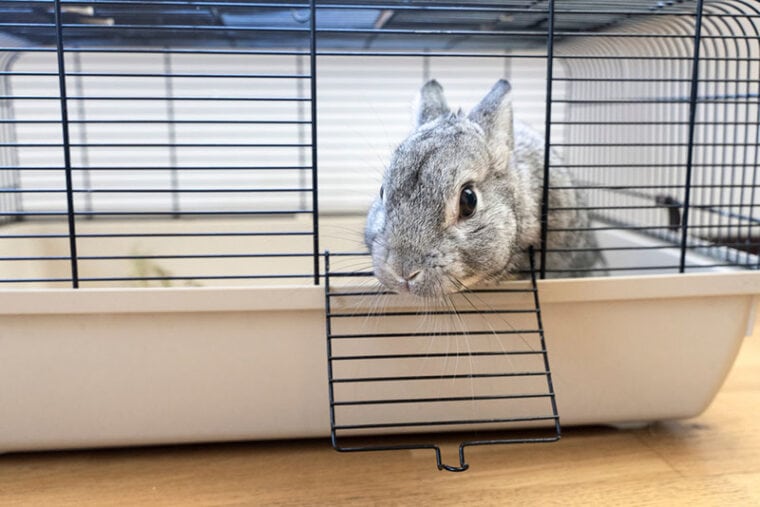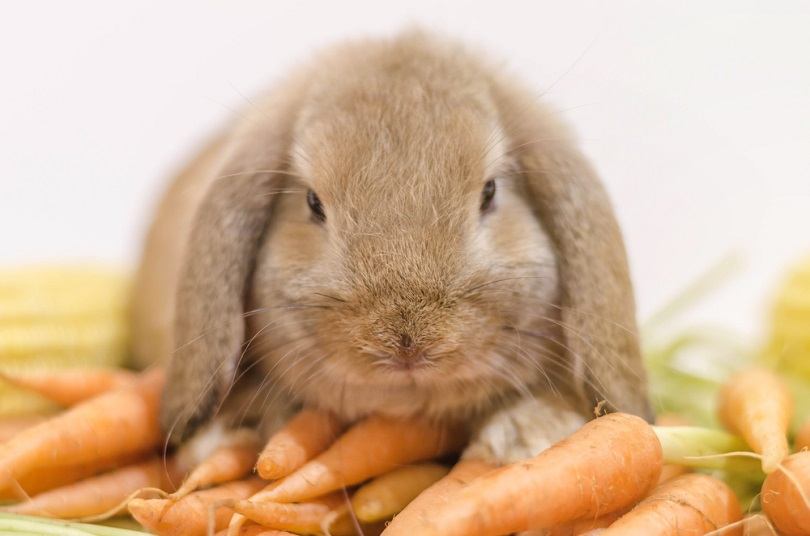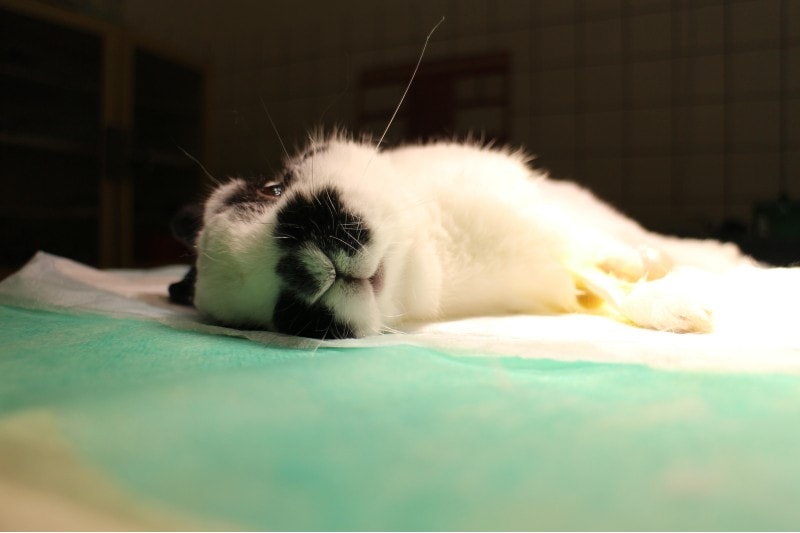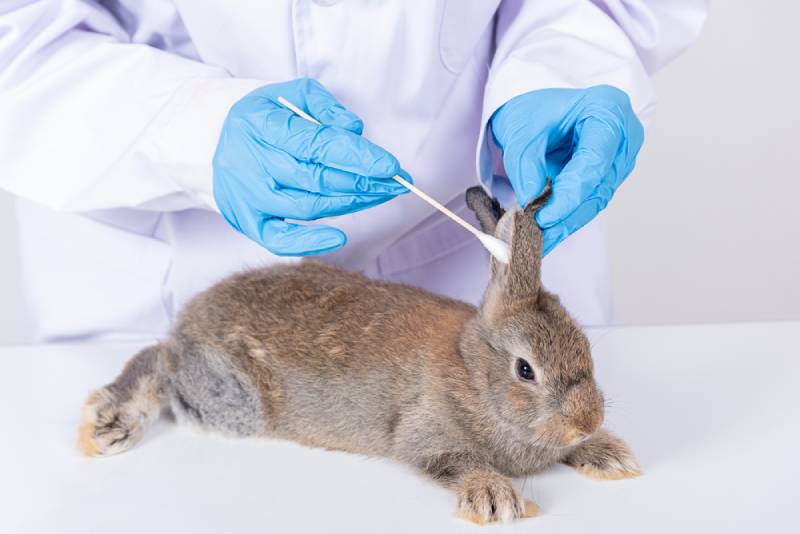
Rabbits are popular pets, lingering closely behind dogs and cats. However, people often wrongly conclude that a rabbit is an easier and lower maintenance pet to look after than their canine and feline counterparts. This is simply not true.
Rabbits have specific requirements when it comes to housing, socialization, handling, diet, and health. While they can make great companions, they require a considerable amount of care. They also have several quirks and health issues that you need to monitor for, including red urine! The good news is that red urine doesn’t always mean there is an underlying problem. The bad news is that if there is indeed a problem, it can be difficult to determine what exactly that is.
Read on to learn more about why your rabbit’s pee is red and what you should do about it.
A Variation of Normal
It’s important to note that just because your rabbit’s pee is red, that doesn’t mean their urine has blood in it. It is also normal for a rabbit’s urine color to vary in appearance—it can be anything from clear and golden yellow to amber and red.
The 7 Possible Reasons Your Rabbit’s Pee is Red
Here are a few non-concerning factors that may be contributing to your rabbit’s red urine.
1. Hydration Status
Urine color can change depending on how hydrated your rabbit is, and it can even change throughout the day. Fresh, clean water should be available to your rabbit 24 hours a day. A well-hydrated rabbit usually has clear or light-yellow urine. As they become more dehydrated, the urine will darken in color. If the urine becomes dark brown, this is a sign that your rabbit is very dehydrated and should receive medical attention as soon as possible.
2. Ingestion of Plant Pigments
Rabbits are herbivores and continuous grazers. A good diet for a rabbit should consist mostly of hay, with small amounts of leafy greens and vegetables. Pigments called porphyrins from these certain greens and vegetables may result in your rabbit excreting red urine. Broccoli, cabbage, dandelions, and carrots are a few plants that can cause discolored urine. In this situation, it’s usually nothing to worry about.
Rabbits that have urinary pigment changes will usually not show any other clinical signs and will be otherwise healthy.

3. Antibiotics
Certain pigments in antibiotics and other medications can cause urine discoloration and make it appear reddish orange in color. So, if your rabbit is on a course of medication, check with your veterinarian whether discolored urine is a potential side effect. Although it is poorly described in literature, it is a known side effect of certain medications, and when it is not coupled with other signs of urinary problems, it is not likely to be serious.
Blood in the Urine
Hematuria is when blood originates from the urine stream itself. A simple test will determine whether the discoloration is simply normal pigmentation or blood. Your veterinarian will do a urinalysis, which will show if there is blood in your rabbit’s pee and will flag any other abnormalities, such as an infection or stones. However, you can’t always see blood in the pee with the naked eye; it’s often present at the microscopic level.
So, what are a few causes of blood in your rabbit’s pee?
4. Calcium Stones
Excess calcium in the diet can result in the formation of urinary stones. A rabbit’s calcium metabolism is different from most mammals, where calcium absorption from the gut is regulated hormonally so they don’t end up with too much in the blood. Rabbits absorb calcium from their food whether they need it or not, and the excess is then excreted through the urinary tract, forming a sort of sludge in the urine. Calcium levels that are too high in the diet can eventually result in a blockage of the urethra, which requires emergency treatment and surgery.
Rabbits that are overweight, have limited access to fresh water, and have underlying problems that contribute to a lack of mobility can increase the risk of urine sludge.
5. Bladder Infections
Bladder infections result from bacteria accumulating in the urinary tract. Several risk factors can increase the risk of a rabbit obtaining a bladder infection, including obesity, inappropriate diet, confinement, lack of exercise, not drinking enough fluids, and inadequate cleaning of their living space. Besides red urine, other signs may include frequent urination (of small amounts) and incontinence. Treatment usually involves antibiotics and a change in husbandry practices, such as increasing their exercise and water consumption.
6. Reproductive Tract Issues
For female rabbits especially, problems with the reproductive tract can cause blood to be present in the urine. Diseases of the reproductive system can result in bleeding into the vagina, which is different from there being blood in the urine stream itself. Usually, in these cases blood will pool within the vagina and be pushed out after the urine stream. There may also be bleeding separate from urination. Uterine cancer, polyps, hormonally induced thickening of the uterine lining, pregnancy, abortion, and infections of the uterus can all cause blood in the urine stream.

7. Injury
Injury to any part of the genitalia or urinary tract may cause blood in the urine. Your veterinarian may conduct a urinalysis on your rabbit, alongside certain imaging tests (such as X-rays and ultrasound) to help guide them to a diagnosis of where the bleeding originates. Injury may result from trauma, but the most common cause is urinary stones.
Conclusion
While alarming to witness, red urine in rabbits isn’t always a cause for immediate concern. However, when coupled with other clinical signs, such as difficulty urinating, changes in urination habits, pain, lethargy, and inappetence, it prompts a swift visit to your veterinarian to rule out any serious disease. Rabbits can mask any signs of illness quite well and then proceed to deteriorate quickly, so if you have any concerns with your pet rabbit, seek advice from your veterinarian straight away.
Featured Image Credit: Alex Desanshe, Shutterstock









